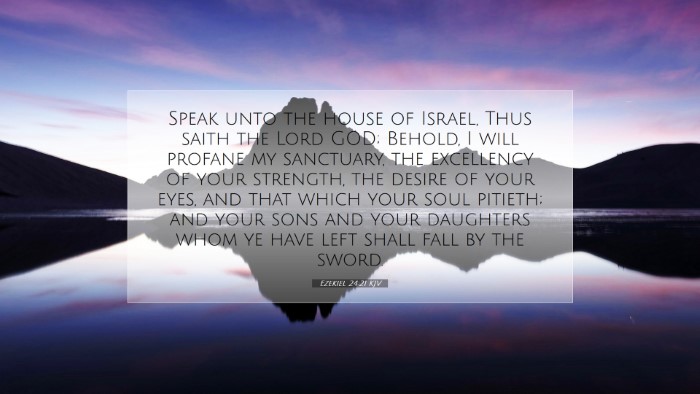Ezekiel 24:21 - Commentary
Bible Verse: "Speak unto the house of Israel, Thus saith the Lord God; Behold, I will profane my sanctuary, the excellency of your strength, the desire of your eyes, and that which your soul pitieth; and your sons and your daughters whom ye have left shall fall by the sword."
Introduction
The verse from Ezekiel 24:21 is a profound proclamation from God regarding the impending judgment on Israel. This verse reflects God's emotional connection with His people and the tragic consequences of their unfaithfulness. Through insights from notable public domain commentaries, we shall unpack the multi-faceted implications of this verse and its lessons for contemporary faith and practice.
Contextual Exploration
In Ezekiel's prophetic ministry, the themes of judgment, restoration, and divine sovereignty are interwoven. This specific verse is set against the backdrop of God's punishment for Israel's idolatry and rebellion. The pivotal nature of the phrase "I will profane my sanctuary" signifies the severing of God's covenant relationship with His people, culminating in a loss that was both spiritual and physical.
Matthew Henry's Commentary
Matthew Henry emphasizes the gravity of God's declaration in this verse. He articulates that the sanctuary symbolizes God’s presence among His people. Its profanation indicates that God would withdraw His favor and protection. The sanctuary that was once the center of Israel's worship would become a place devoid of holiness. Henry notes that this act serves to humble the self-righteous and awaken the complacent to the seriousness of sin.
Albert Barnes' Insights
Albert Barnes offers a detailed exposition on the implications of profaning the sanctuary. He points out that the phrase "the excellency of your strength" refers to the very source of Israel's national pride and stability, which was to have been God Himself. By abandoning their commitment to divine principles, they had alienated themselves from the ultimate source of strength. Barnes articulates that the emotional weight of "the desire of your eyes" speaks to what Israel cherished most, signaling a devastating loss that would strike deeply at their hearts.
Adam Clarke's Remarks
Adam Clarke delves into the metaphorical meanings behind the imagery in this verse. His commentary highlights the psychological dimensions of loss expressed through the mention of "sons and daughters." Clarke explains that the future generations of Israel are not merely statistics; they represent the continuance of God's people and culture. The destruction of these young lives tragically symbolizes the extinguishing of hope and legacy, with Clarke underscoring how this serves as a dire warning against the consequences of moral and spiritual complacency.
Theological Themes
- Judgment and Mercy: This verse illustrates the duality of God’s nature; while He is a God of mercy, He cannot overlook sin indefinitely. His judgments are often a necessary response to lead the wayward back to Him.
- The Sanctity of Worship: The profession of faith and worship cannot be taken lightly. The sanctuary's desecration signifies that true worship must spring from genuine devotion and obedience to God’s commands.
- Emotional and Relational Aspects of God: God's references to Israel's emotional attachments (their "desire" and what they "pitieth") reflect His own emotional investment in His people. It reminds believers of the relational aspect of faith, where God desires a true, heartfelt connection with humanity.
Practical Applications
The insights from this verse extend beyond theological reflection, providing valuable lessons for contemporary believers:
- Awareness of Spiritual Complacency: The church today can become complacent, losing sight of the sanctity of its relationship with God. This passage serves as a call to reevaluate priorities and ensure that worship reflects a heart aligned with God's will.
- Generational Responsibility: Just as the judgment affected Israel's children, today's believers bear responsibility for the spiritual legacy they leave for future generations. It emphasizes the importance of instilling faith and values in the young.
- Understanding God's Sovereignty: Recognizing that God's plans incorporate both judgment and mercy can inspire hope and a readiness to return to Him at any point. This verse reminds us that while God’s judgment is serious, His desire is for repentance and reconciliation.
Conclusion
Ezekiel 24:21 stands as a poignant reminder of the costs associated with unfaithfulness to God. Through the insights garnered from esteemed commentators, we see the profound implications of this verse resonate through the ages. For pastors and theologians, it embodies an urgent message: the need for authenticity in worship and commitment to divine covenant. May this reflection encourage a deeper examination of our relationship with God, fostering a faith that is vibrant and impactful.


